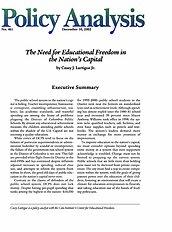The public school system in the nation’s capital is failing. Teacher incompetence, bureaucratic corruption, crumbling infrastructure, violence, lax academic standards, and wasteful spending are among the litany of problems plaguing the District of Columbia Public Schools. By almost any educational achievement measure, the children attending public schools within the shadow of the U.S. Capitol are not receiving a quality education.
While critics of DCPS tend to focus on the failures of particular superintendents or administrators bedeviled by scandal or incompetence, the failure of the government-run school system in the District of Columbia is not new. This failure preceded white flight from the District in the mid-1950s and has continued despite inflation-adjusted increases in spending, reduced class size, and attempts to reform the system from within. In short, the good old days of public education in the nation’s capital never were.
Contrary to the claims of defenders of the public school system, DCPS does not lack money. Despite having per-pupil spending that ranks among the highest in the nation–10,550 for 1999–2000–public school students in the District rank near the bottom on standardized tests and in achievement levels. Although spending has almost tripled since the 1980–81 school year and increased 39 percent since Mayor Anthony Williams took office in 1998, the system lacks qualified teachers, safe facilities, and even basic supplies such as pencils and text-books. The system’s leaders demand more money in exchange for more promises of improvement.
To improve education in the nation’s capital, we must consider options beyond spending more money in a system that even supporters acknowledge is troubled. Change must not be limited to propping up the current system. Public schools that are little more than holding pens must not be sheltered from private competition. The city must find a way to create competition within the system, with the goals of giving parents power over the education of their children, fostering an environment that will create a climate for education entrepreneurs to flourish, and taking education out of the hands of feuding politicians.

This work is licensed under a Creative Commons Attribution-NonCommercial-ShareAlike 4.0 International License.

